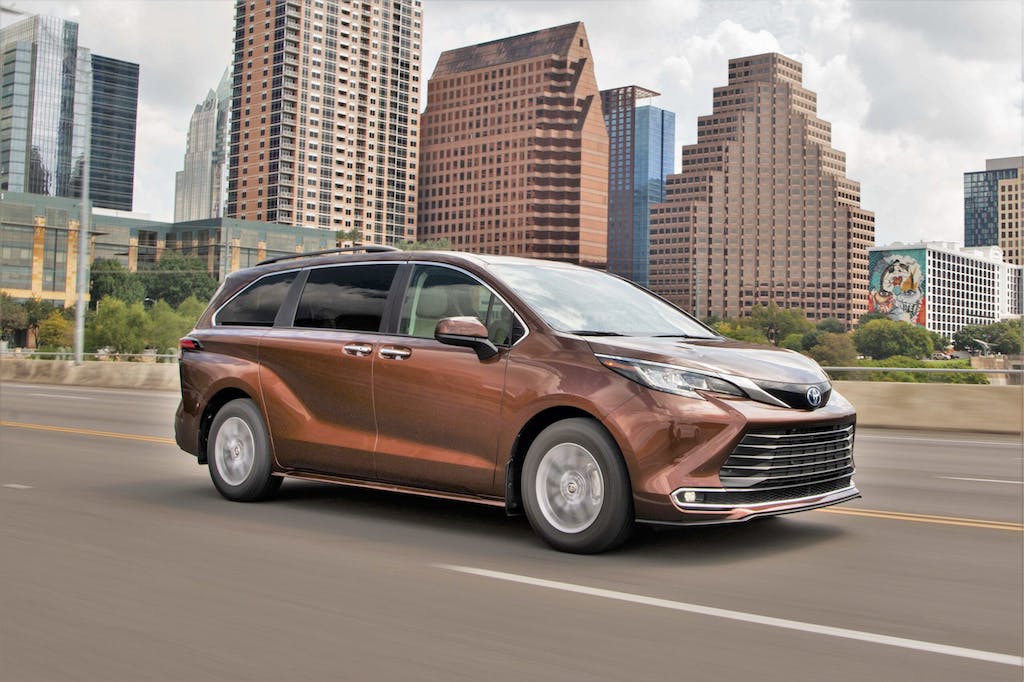
A hybrid SUV is an excellent choice for families who want a car that is comfortable, fuel-efficient, and has a smooth ride. A hybrid is more expensive than a standard SUV, but the savings can be significant. Hybrids available with all wheel drive are more common than standard SUVs. This is an excellent option for driving in snowy areas or other difficult terrain. This can be an appealing alternative to regular gas-powered SUVs if you have a short time and need to get to your destination quickly.
The decision to buy a hybrid depends on several factors. The first factor is your budget. Next, it's time for you to think about your requirements and preferences. You might want a vehicle that can carry a lot of passengers, and you may want a larger cargo area. For its fuel efficiency, you might want a hybrid SUV. Depending on which vehicle you choose, you might get between 30 and 40 miles per gallon.
Toyota Highlander, a compact hybrid SUV is the best choice. You can choose from a range of trims to get this popular model, which offers many great features at a reasonable price. The XLE, which comes in the top trim, has an 8-inch touchscreen and second-row seats that can be folded down. It also features a rear-mounted, electric motor. You can also choose an on-demand, all-wheel drive system.

The Hyundai Tucson also comes in a gas/electric hybrid variant, with 33 miles of allelectric range. However, the base engine offers slow acceleration and lackluster power. You can upgrade to turbocharged hybrid for greater performance. The Tucson's interior is large for its class and features a quiet cabin.
The Lexus RX 450h combines luxury and performance with a powerful engine. This three-row hybrid SUV starts at just under $50,000, and it produces up to 308 hp. The Lexus AWD system ensures a comfortable ride. Additionally, it has outstanding safety features. A hybrid RAV4 can be purchased, which is known for its reliability.
The Kia Sorento SUV is another option. It is a midsize SUV. The Sorento is offered in eleven different trim levels. The PHEV version is a little more expensive, but it offers better gas mileage and an upgraded suspension. The PHEV version also includes blind spot assist and safe exist assistant. The LE AWD-e trim costs $27.135 for the PHEV version.
The Toyota Highlander has a good reputation for both reliability and ease of use. It can seat up to eight passengers, and its all-wheel drive system is affordable. There are many standard features. It also has great safety technology like forward collision warning and pedestrian detection. The dashboard also houses a charging station for smartphones.

The Honda CR-V midsize SUV is a highly-respected hybrid model. For many years the CR-V remains a popular choice. Its ability to provide both space and performance has helped it earn a solid reputation. A hybrid version of the CR-V can be a great option for those who don't want to sacrifice off-road capability.
FAQ
What qualifications do I need to be a truck mechanic?
Although you don't need to have any formal qualifications, your experience working with trucks and engines is invaluable. You are a valuable asset as you can quickly diagnose and solve problems efficiently.
Your knowledge of diesel technology will allow you to identify the parts that are required to fix our vehicles.
To work as an automotive mechanic, do I need a degree? Do I have to study part-time?
While a degree is not required, it does help. Employers will prefer candidates who have completed a degree. It shows that you've worked hard and are determined to succeed.
This doesn't necessarily mean you can't continue to work while studying. Some universities allow students to complete coursework over the summer holidays and finish their studies later in the year. Some universities allow students to take part-time classes throughout the year.
What's the difference between a mechanic and an automotive technician?
They are both similar, but not identical. A mechanic repairs cars while an automotive technician does maintenance on them.
A mechanic must possess good manual dexterity, and be able perform simple tasks efficiently. They should also be able correctly diagnose and repair any problems.
An automotive technician requires more technical skills than a mechanic. They need to be able use tools such drills and wrenches, and read blueprints.
They must be able and competent to safely perform complicated procedures. They must also be familiar with different types of engines and electrical systems.
They must also be capable of understanding how parts interact.
A mechanic typically earns less than an automotive technician. But there are many opportunities for both jobs.
Is it hard being a mechanic apprentice
It's not easy, but you learn fast, and there are many opportunities for advancement.
You will need patience and perseverance. You must also know how to fix cars, trucks, and motorcycles.
Customers and family members will put pressure on your shoulders to help you succeed. You shouldn't feel pressured to make decisions that you don't like.
If you enjoy fixing cars, it could be a great career choice. This is a job that allows you to earn a decent income and grow your business.
However, you might prefer to go down another route. If this is the case, you might want to become a technician.
This means that you can use your technical knowledge to help other workers. Technical support could include helping technicians to troubleshoot issues or teaching them new techniques.
Another option is to become an advisor in service. As a service advisor, you will provide assistance and advice to customers as they bring their car to a garage.
Your decision depends on what you want to do. There are many options, so you can choose the one that suits you best.
What jobs are available for car mechanics?
There are three main areas of employment for car mechanics:
-
Automotive repair shops
-
Dealerships
-
Independent garages
Automotive repair shops
It's where most people start to think about becoming a mechanic. This is the best way to get started. Either you can work in a shop that is owned by another person or start your own business.
If you are interested in working at a shop you will need to apply for membership to a union. After being accepted into the union, the union will provide training.
After completing the training, you'll be ready to start work.
If you decide to open your own garage, you'll need to register with the government. After you have registered, you will need to meet certain standards.
Once you register, you'll receive a license that allows you to operate your garage.
Your license allows for minor repairs and spare parts sales. It will not permit you to fix major engine issues.
Customers will expect you to not only sell spare parts but also provide advice and guidance.
Dealership jobs
Most dealerships employ mechanics who specialize in one area of the car. For example, they might only deal with brakes or only replace tires.
Some dealerships hire general mechanics to handle all aspects of car repair.
Many of these positions require that applicants undergo training before they are allowed to work. Employers can then choose the best candidates for their job.
Some dealerships will hire graduates straight from college. These graduates are familiar with the fundamentals of mechanical engineering so they can easily learn about cars.
Independent garages
Independent garages don’t have to be associated with any particular dealer. Instead, independent garages tend to concentrate on providing high-quality services.
Independent garages can pay higher wages because they aren't associated with any company. Because these jobs don't have to be associated with any company, they can generally offer better wages than dealerships.
Independent garages can be just as good places to work, but this does not mean they are better. Many business owners prefer to own their businesses and not delegate the responsibility to others.
You might find yourself working long hours but having no control over what happens in the day.
Also, expect to make lower wages than if your job was at a dealership.
There are many jobs that can be switched between. If you want to work at a dealership, then you simply need to ask your current employer if he would consider hiring you as a mechanic instead.
You could also apply directly to an owner of a garage if that's what you want.
The bad news is that finding a new job isn't always easy. Many other factors can also influence the amount you earn.
It could be the type and cost of labor you use to repair your vehicle.
What is the best way to learn about car mechanics
For an auto mechanic job, you don’t have to be an expert in cars. Only you need to know how things work. Most people start by fixing things like changing tires or fitting brake pads.
You need to be able read and comprehend diagrams, follow written instructions and adhere to basic principles of good practice. Also, you will need to know how to tell if parts require replacing or repair.
It is important to remember that proper training and guidance are essential for anyone who attempts to repair vehicles. This is especially important if you work with expensive parts such as transmissions or engines.
Although you won't have to know much about automobiles, you must be familiar with the basics of mechanical engineering as well as physics. This will include understanding the basic principles of engine operation and brake function.
It is also important to remember that you will need to be able to handle many situations. If your vehicle has been in an accident, you might need to be able to handle it. You'll also need experience dealing with breakdowns and accidents.
Finally, you must be willing to learn new skills quickly. In order to be able diagnose and fix problems, you will also need to know how to do simple maintenance tasks such tightening bolts.
What does it take for a mechanic to be a good one?
Expert mechanics take years of practice and extensive experience. It is best to learn how to fix cars under the supervision and guidance of a professional mechanic.
You will have to spend time in a garage learning about cars and mechanics. You will need to be familiar with mechanical engineering books about mechanics, car design, and other topics.
You will also need to go to auto school.
It's crucial to start as soon as possible. Don't wait until you're older to begin studying automotive technology. Do you want to be a mechanic? Get started today!
Statistics
- The U.S. Bureau of Labor Statistics (BLS) reports that the job outlook for automotive service technicians and mechanics is expected to decline by 4% from 2019 to 2029. (indeed.com)
- According to the BLS, total auto technician employment is expected to exceed 705,000 by 2030. (uti.edu)
- 52% of Mechanics in the United States think their salaries are enough for the cost of living in their area. (indeed.com)
External Links
How To
How to Become an Automotive Technician
Automotive technicians provide repair and maintenance services to vehicles. He/she works at car dealerships, auto shops, garages, service centers, etc. He/she works with customers to repair their cars and trucks, ATVs or snowmobiles. An automotive technician must have the ability to quickly diagnose and fix problems.
An associate degree from a vocational school is required for anyone who wishes to become an automotive technician. After completing the program, he/she must pass ASE certification. ASE stands as American Society of Mechanical Engineers. There are two sections to the ASE certification test. One section tests mechanical knowledge; the second section tests practical skills. You will need to attend an authorized testing site in order to pass the test. These locations can be found online or at your local auto dealer.
After passing the exam, a candidate must take a state exam before being licensed as an automobile technician. This process can vary depending on where the applicant lives. For example, some states require candidates to attend a training course, while others allow them to study independently. Some states permit technicians to work immediately after they are granted their license. Others require them to wait at least six consecutive months before they can be licensed.
Apply to your local dealership to become an automotive technician. Most new employees work as apprentices after they have been hired. Apprenticeship programs typically last three to four years. This is when a student can learn how to do basic repairs such as changing oil, adjusting brakes and replacing tires. Some students will learn advanced repair techniques, such as changing shocks, installing air filters, and replacing engines. Schools offer classes during business hours. Some schools also offer evening classes when needed.
Once a student completes his/her apprenticeship, he/she becomes a journeyman. Journeymen usually spend four to five year learning how to install major systems like transmissions, differentials steering gear, suspensions, drive shafts, and steering gear. They are also taught how to troubleshoot electrical components and remanufacture engines. Because they have a good understanding of the job and what customers expect, many employers prefer to hire journeymen.
Once a candidate passes the required exams and is granted a license, they might consider opening their own shop. According to Bureau of Labor Statistics, there were almost 1.7 million available jobs in the automotive mechanic field in 2010. This figure is expected to rise 18 percent between 2009-2020. If a candidate decides to open his/her own shop, he/she should prepare to invest many thousands of dollars in equipment and supplies.
The salary for an automotive technician depends on several factors, including the type of employer, location, education level, and experience. A jobless person can expect to make $20,000 per year. An individual with a high school diploma can earn about $21,000 per annum. Associate's degrees earn approximately $24,000 per annum. Technicians with bachelor's degrees earned about $27,000 per year. Master's degree holders make around $32,000 annually. Salaries are increasing so that a professional earning less than $30,000 could expect to make $40,000 in a few years.